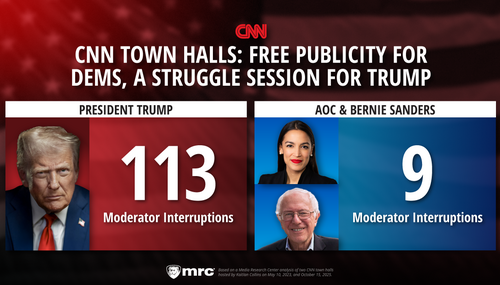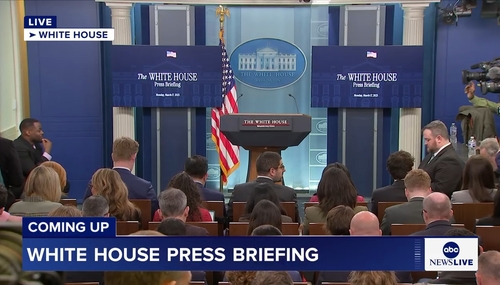While the broadcast networks have generally empathized with the distress of airline passengers over the TSA’s new and intrusive airport searches, they have not — thus far, at least — gone so far as to impugn the Obama administration as launching a war against Americans’ civil liberties.
Indeed, NBC’s Matt Lauer on Monday even sympathized with TSA Administrator John Pistole: “I hate to even think of what happens if the government caves in on this, and relaxes these procedures, and someone manages to get something on board a plane and causes harm. Imagine the questions you'll be asked at that point.”
But that’s not the approach those networks took when it was the Bush administration taking steps to protect citizens against potential attack. Instead, as a 2006 analysis by the Media Research Center documented, the networks firmly aligned themselves with those who saw the Patriot Act and the electronic surveillance of international phone calls as a dire threat to civil liberties.
While some on the Left claimed the media were enthusiastic boosters of the Bush administration in the days after 9/11, our analysts found network reporters began to question the idea of a vigorous War on Terror within days of the attacks. During live coverage on September 13, 2001, ABC’s late Peter Jennings suggested the United States might no longer be a free country. "Much of the evidence now being obtained in this investigation is being obtained under something called the Foreign Intelligence Surveillance Act, which is pretty much equivalent, I think some people believe, to martial law," Jennings told former Clinton Justice Department official Eric Holder.
"As a result," Jennings wondered, "do you believe that civil liberties have effectively been suspended in the country?"
Ms. Sotirelis was celebrated for "quietly leading a charge against the U.S. Justice Department." Rather than cooperate with a possible request from the FBI for records pertaining to a valid terrorism investigation, Cowan saluted how some libraries were taking "drastic measures, shredding all their check-out records." He fawningly asked Sotirelis, "Do you feel like you’re on the front lines of defending democracy?" She replied, "In a way, yes. But librarians always are."
Out of 91 stories on the Patriot Act, only five noted that there have been no violations of civil liberties in the years since the law was enacted. Citing a Justice Department memo on the September 18, 2003 World News Tonight, Peter Jennings revealed that "the FBI has never used a provision of the law which gives it more power to obtain business records, including credit card statements and even library records, in terrorism investigations." So much for the "revolutionary" librarian "leading a charge" against the FBI.
And only NBC’s Pete Williams on September 10, 2003, told viewers that some of the supposedly controversial elements of the Patriot Act — including the provision for "delayed notification," where a warrant can be executed to search a home or business and the subject only told about it after the fact — were already legally-approved techniques for anti-drug and mob cases prior to the Patriot Act becoming law.
All of the networks favored experts, mostly lawyers or law professors, who disapproved of the Patriot Act. Of 23 soundbites from experts, 61 percent faulted the law as a threat to privacy rights. Of the 19 ordinary citizens who made it onto the network evening newscasts, all of them were critics like the librarian cited above, even though the networks’ own polls showed that the public largely approved of the Patriot Act.

CBS anchor Bob Schieffer began the Evening News by presenting the President as tilting toward criminality: "It is against the law to wiretap or eavesdrop on the conversations of Americans in this country without a warrant from a judge, but the New York Times says that is exactly what the President secretly ordered the National Security Agency to do in the months after 9/11."
The NSA program that the Times disclosed is aimed at uncovering plots similar to 9/11, where terrorist operatives were present in the United States weeks and months before the actual attack. The program only focused on calls in which one party was outside the U.S. As General Michael Hayden, director of the NSA when the program began, explained at a January 23, 2006 National Press Club speech: "This is hot pursuit of communications entering or leaving America involving someone we believe is associated with al-Qaeda."
The networks were far less interested in the program’s value to disrupting potential terror plots than stressing the hypothetical dangers to Americans’ privacy. Most stories stressed topics that troubled liberals: the potential for violating Americans’ civil liberties (64 stories, or 50% of the total) and questions about whether the President had exceeded his constitutional powers (38, or 30%). Relatively few stories (21, or 16%) discussed the value of the surveillance program in the overall War on Terror.
Network coverage, particularly during the first few days, portrayed the NSA revelations as a Bush administration scandal. In the seven days after the New York Times revealed its existence, the three networks ran a combined 23 stories about the NSA program, more than one story per night. Reporters portrayed the program as evidence of transgression, not an effort at protection. "Tonight, President Bush [is]...under fire for authorizing the National Security Agency to spy on Americans," CBS’s John Roberts claimed on the December 18, 2005 Evening News.
"The revelations about spying have overshadowed the President’s recent efforts to explain his Iraq strategy," ABC’s Martha Raddatz asserted on the December 19, 2005 World News Tonight, leaving aside the fact that it was the media who opted to focus on the NSA program and thus "overshadow" the other news. "You can expect the White House to continue to try and get the message out about Iraq," Raddatz told anchor Elizabeth Vargas, "but this spying story is not going away."
Most (59%) of the networks’ NSA stories cast the program as either legally dubious or outright illegal. On the December 19, 2005 World News Tonight, ABC’s Pierre Thomas cast the President as acting unlawfully: "The Constitution grants the President the powers of Commander-in-Chief, but scholars argue it says nothing about unbridled presidential power to eavesdrop."
While the networks presented the actual NSA program as of dubious legality, they had almost nothing to say about the legality of the leaks to the New York Times and USA Today that exposed the classified information. Just five network stories (4%) focused on the potential illegality of the leaks to the media, or the decisions of the two newspapers to publish government secrets.
Indeed, when network reporters mentioned the leak investigations, they portrayed it as part of an attack on the news media. "A federal probe of a New York Times report threatens to further chill the President’s relationship with the news media," CBS’s Joie Chen argued on the December 31, 2005 Evening News.
Apparently, the possible illegality of divulging government secrets to the New York Times did not trouble network reporters. But those same journalists seem to regard the government’s monitoring of overseas phone calls involving potentially dangerous terrorists as a great threat to the public — greater, presumably, than the danger posed by damaging the government’s anti-terrorism efforts by disclosing them to the world.




